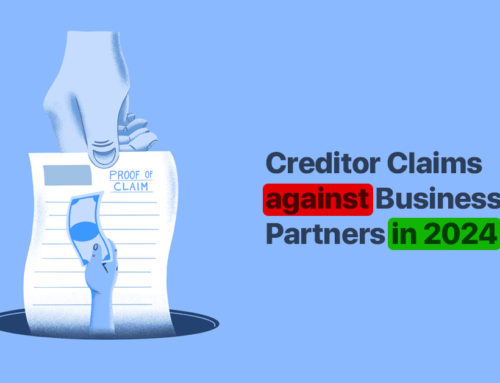I’m sure many of us have been in the situation of having a company that owes us money but being unable to contact them. They don’t answer emails, telephone calls are ignored, rumours fly around about the business struggling. In these circumstances, questions arise. Are they still trading? Has the business closed? Are they in liquidation? So just how do you find companies that are going out of business?
An online search
There are a wide range of online sources available that will advise if a company that owes you money is going out of business, or has already been wound up. The UK government has an online checker where you search their records. All you need is either the company name or its registration number.
This website is also the place to search if a sole trader or partnership company is in ‘provisional liquidation.’ This is when compulsory liquidation has been forced upon the company. The court has frozen the company’s assets and bank accounts prior to a hearing to determine if the company should be liquidated.
The best source to check this status is on the Government’s website which will list companies that have received a winding up petition. The Government also has an updated list of companies that are under bankruptcy restrictions, i.e. the sole trader, individuals or partners have broken a Debt Relief Order or bankruptcy terms.
Most debt management companies offer a credit check, insolvency test or free online search to determine if a company is still trading or has gone out of business.
As all limited companies, including limited liability partnerships, are registered with Companies House, carrying out an online search on the Companies House website will reveal basic details about the company, such as its current trading status and any insolvency history including the administrator details. However, because it takes time to process the latest information, their website may not always be completely up to date.
Companies that enter into liquidation, administration or receivership are announced in The Gazette, which is done by the appointed insolvency practitioner/liquidator. As these announcements must be put into The Gazette within seven days of the creditors/directors meeting and notices of appointment being issued, The Gazette is probably the most up-to-date source.
If the company’s website is still active, as well as their social media pages including LinkedIn, Twitter and Facebook, check for online activity to see if there are any announcements on the website, or if the company is still posting social media updates.
It is always worth doing an online search for any news items or possible press releases about the company. Keep an eye on local press and it if it is a large company, the national press as well. For example, the staff and suppliers of City Link found out that the company had gone into administration on Christmas Day in December 2014 from an article published in The Guardian newspaper!
Do a credit check
It’s more than likely that a credit check will have been carried out prior to agreeing to offer the company credit. However, go back over the credit check report to see if there are any updates to the company’s financial position. Has it ceased trading or are there excessive levels of debt? There are many online companies that are able to offer credit reports but be careful, the cheaper or free websites rely on information from Companies House, which may be out of date.
Is there a licence, and is it still valid?
Some businesses require a licence to trade, such as a pub or restaurant, which gives them the authority to sell food and drinks. It is the local council office that has the power to agree to a licence so it is worth contacting them to discover whether the company’s license is still valid, or if it has been cancelled/not renewed. If this is the case, it is a good indication that the company has gone out of business.
Sourcing liquidated inventory
There are some businesses and individuals that keep a close eye on companies that have received a winding up petition, are in administration or have entered the liquidation process. Businesses that are struggling or have been forced into closure present a great opportunity for those that are interested in either acquiring the business in full, or its related assets.
For companies that are insolvent, be it sole traders, partnerships or limited companies, selling off their assets is crucial in order to raise funds to pay their debts. There are also companies that are struggling to stay in business who will sell their surplus stock, or inventory, to raise the required capital to pay their creditors, or to re-invest in the business.
For any business, staying aware of inventory levels is a priority; too much stock will severely impact cash flow and the bottom line. That’s not to say that companies don’t get caught out when it comes to stock levels. For example, there may have been a downward turn in demand of a product, or a line did not sell as well as expected. When in these situations, it is important to act quickly and sell excess inventory.
Businesses often offer massive discounts on old product lines or group different yet similar products together to offer as a bundle. They also up-sell lines that aren’t moving well with products that are, offer the old, non-moving product as a free with the purchase of a popular item. Businesses also shift stock by encouraging membership or subscriptions to a mailing list where the product is offered as an incentive, and there’s also the option of selling online.
Online sites such as Amazon, eBay and Etsy are full of companies selling products that are non-moving, no longer required or non-trending products. For bulk products, consider a liquidation company to purchase liquidated inventory and excess stock which they will sell on behalf of the company.
However, note that with both of these routes, fees are payable on the sale of the products. In addition, some liquidation companies specialise in certain markets, and some may also cherry-pick items they know they can sell quickly, and will buy at a much lower price.
If you are planning on liquidating your company, the first step is to seek professional advice. Our highly experienced professionals at Leading UK are on hand to help and advise on the process. Please contact us on 01603 552028 or visit our website Leading UK for more information on how we can help you.






